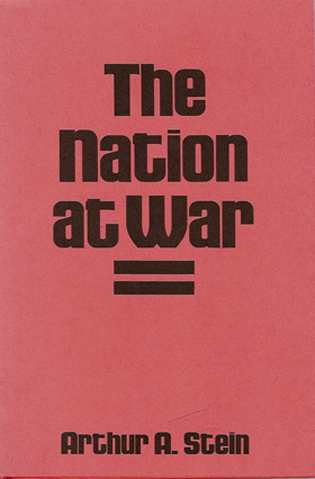
The Nation at War. Baltimore, MD: Johns Hopkins University Press, 1980.
Over 100 million people lost their lives in war during the twentieth century alone. Even more have seen war destroy their societies and restructure their countries - politically, economically, and socially. Throughout history, scholars have used war to mark major turning points in human events, yet its domestic, social, and economic consequences have not been systematically investigated either by historians or, more importantly, by the policymakers responsible for leading their countries into prolonged conflict.
In The Nation at War, Arthur A. Stein begins the long-overdue evaluation of war as a public policy. By reexamining the conventional wisdom about war in light of empirical data concerning domestic changes during wartime, Stein develops a theory linking wartime mobilization to national cohesion, concentration of production and government control, and inequality in the distribution of goods and services. What emerges is a sound, well-balanced argument that offers new and often provocative conclusions about the effects of armed conflict on a nation and its citizenry.
Unlike many other nations, the United States has never been physically or economically devastated by an international conflict; indeed, the prevailing American pattern has been to "fight and forget." This makes the United States an ideal test case for Stein's theory, and he evaluates in depth the effects of World War I and World War II, the Korean War, and the war in Vietnam on the American homefront.
Empirical data support Stein's hypotheses. For instance, his examination of statistics on crime, strikes, political violence, racial
unrest, congressional voting patterns, and public opinion shows that prolonged wartime mobilization actually decreases domestic cohesion. Stein also finds that growth in state power may be used to offset other social effects of wartime mobilization.
All of the author's findings illustrate with new clarity the need for policymakers and analysts to evaluate war as stringently as they would any other public policy or program. Even if a new knowledge of war's side effects cannot prevent leaders from waging war, says Stein, it can at least assist them in minimizing or preparing for any undesired domestic ramifications.
Review:
The Nation at War is an imporant contribution to a realistic understanding of the consequences of war choices. . . . the findings about domestic impacts illuminate in cold and realistic terms major consequences of war as a deliberate policy choice. To the extent that wars are entered into deliberately, we have a growing body of evidence pointing to their wastefulness, anticonservative consequences, and hollow victories.
--David Bobrow, American Political Science Review